Grammar -
Abbreviations and Acronyms

Grammar
Abbreviations and Acronyms


/en/grammar/negatives/content/
Abbreviations and acronyms are shorter versions of existing words and phrases. They're designed to save time and take up less space (whether you're typing or writing by hand), and can even make your writing easier to read.
Abbreviations are all around us, from common titles like Dr. and Prof. to the abbreviations you see on street signs. Specifically, abbreviations are shorter spellings of words and expressions we use every day.
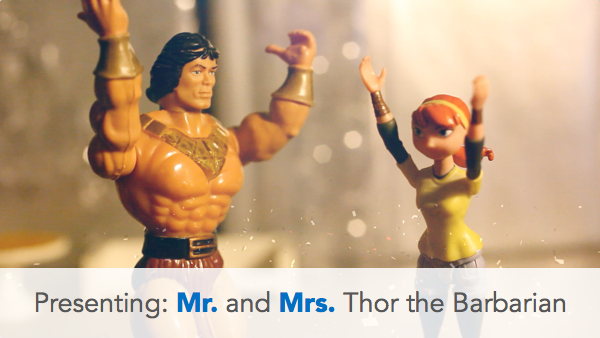
You might already know some acronyms, like NASA (National Aeronautics and Space Administration) and ATM (automated teller machine). An acronym is a stand-in for a string of words, usually an organization name, slogan, or something else equally wordy. Unlike abbreviations, they aren't shorter spellings of words—they're made up of the words' initials.

Abbreviations are usually formed using the most recognizable letters from the word or expression. This makes them easier to remember, and easy for others to read. It's almost like the letters are clues that point to the original word or expression.
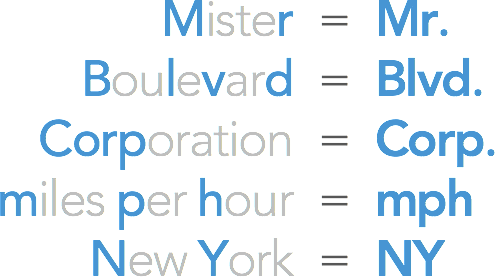
Some abbreviations look like acronyms (for example, mph and NY), but it's really just a coincidence. Technically, these are initialisms, which is a type of abbreviation. Thankfully, you don't have to know whether something is an abbreviation, initialism, or acronym to use it properly. You just have to know what the term means, and how to spell it—everything else will usually fall into place.
Now that you know how abbreviations are formed, you may be wondering how they're pronounced. Most of the time, they're pronounced the same as the original word—whether you're reading it aloud or in your head.
For example, Prof. Snape would be pronounced Professor Snape (not Prof Snape). The abbreviation etc. would be pronounced et cetera (not e-t-c). The important thing to remember is that abbreviations aren't words in the true sense—they're more like shorthand.

There are some exceptions that are pronounced differently. For instance, AM, PM, i.e., and PhD are pronounced exactly the way they're spelled. This happens when the abbreviation becomes more popular than the original term—usually because the original is too long or outdated. For example, AM stands for Ante Meridiem. (That's Latin for before noon. Who knew?)
Luckily, there aren't many exceptions like this, so you don't have to worry too much about making a mistake. Most abbreviations are pronounced the same as the word they're based on, like hr, min, and sec (that's hour, minute, and second).
This is one of the most common questions people have about abbreviations: Do you have to use a period at the end when writing it out? There's no strict rule that says you do—it's kind of up to you.
Sometimes adding a period is expected and can make the abbreviation easier to read. Take the example below. Pop. is the abbreviation for the word population—without a period, it might just look like pop (as in pop goes the weasel).
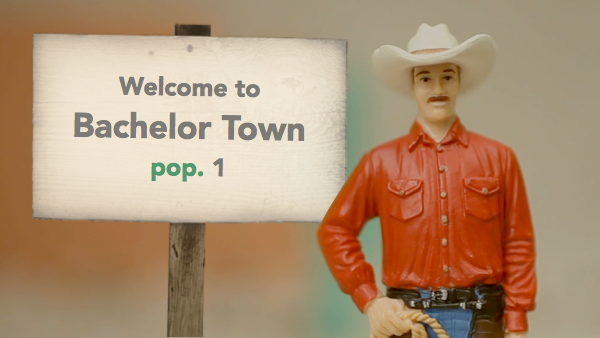
On the other hand, some abbreviations never use a period; for example, state postal abbreviations like NY, CA, and TX. The abbreviation for United States of America can be written with a period between each letter, but it's much more common without. The same goes for measurement abbreviations like ft, in, and cm.

There are abbreviations for so many different things, it would be impossible to list them all here. Here are some of the most common abbreviations you'll see and use:
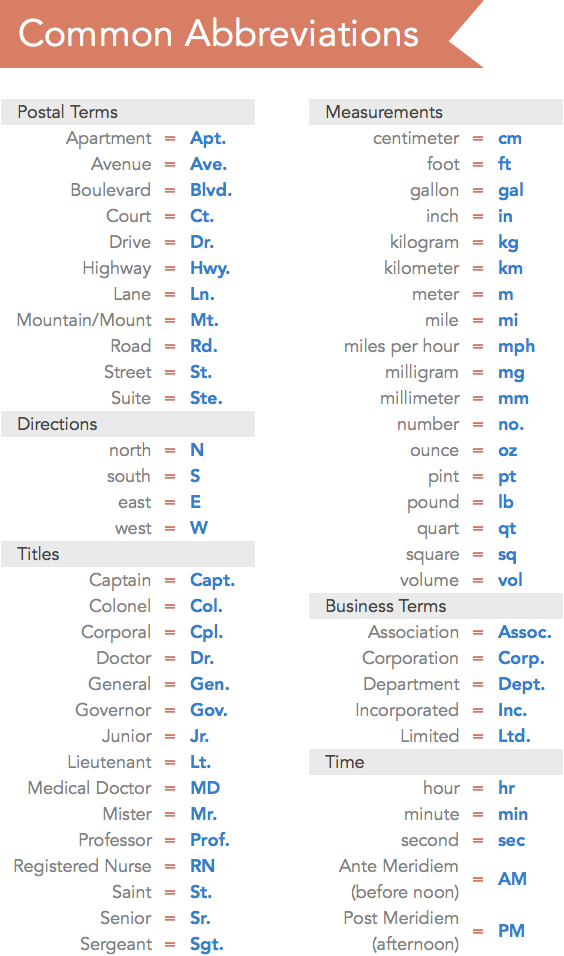
You may have noticed that the abbreviations for ounce (oz) and pound (lb) are a little different from the rest. They're spelled using letters that aren't part of the original word. This is because the abbreviations are based on older forms of each word—ounce comes from the Italian word onza, and pound from the Roman word libra.
What about chat terms like LOL (laugh out loud), BRB (be right back), and plz (please)? Many blur the line between abbreviations and acronyms, but they're abbreviations nonetheless. In other words, they abbreviate something in a contemporary way, using initials, slang, and other shorthand. They make it possible to communicate quickly, and that's what makes them a form of abbreviation.
Look closely at the heading above, and you may find your answer. Believe it or not, OK is an abbreviation too, and we use it on the site all the time.
A good rule for abbreviations is to put the reader first. Ask yourself: Will the abbreviation make the sentence easier to read, or will it confuse the reader (for example, if the abbreviation is too obscure)? If an abbreviation still sounds like a good idea, next consider the context. Abbreviations are perfectly OK in personal and casual writing—they're often OK in formal writing too. You might want to ask your boss or your teacher if you're unsure.
As you read earlier, acronyms are used in place of a phrase or string of words. They're almost always made up of the words' initials and are spelled in all caps. They can represent all kinds of things, from organizations to mnemonics to sandwiches.
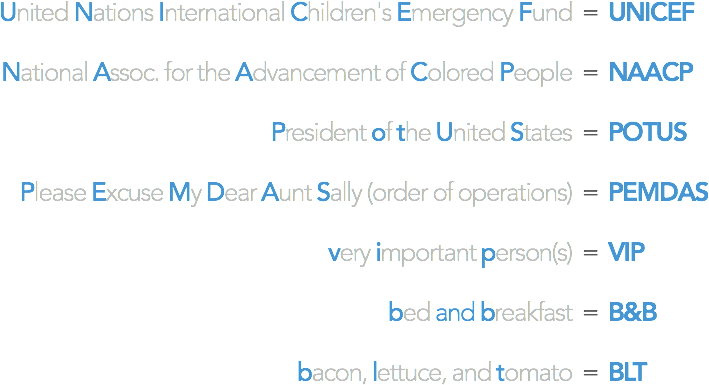
Like abbreviations, there's a lot of overlap between acronyms and initialisms—but remember, this doesn't really matter when it comes to using them. It might help to think of acronyms as something catchier than abbreviations (after all, they represent longer phrases, so it helps if they're memorable). They don't just shorten words; they stand for organizations, ideas, and other things you want people to remember.
Acronyms are read differently from abbreviations. Take the word BLT. If you saw that on the menu at your favorite restaurant, there's a good chance you'd just order a BLT, not a bacon, lettuce, and tomato sandwich. You wouldn't pronounce it built or belt either; you would say B-L-T. This is what makes acronyms unique—you can read them as they appear, even though they stand for something else.
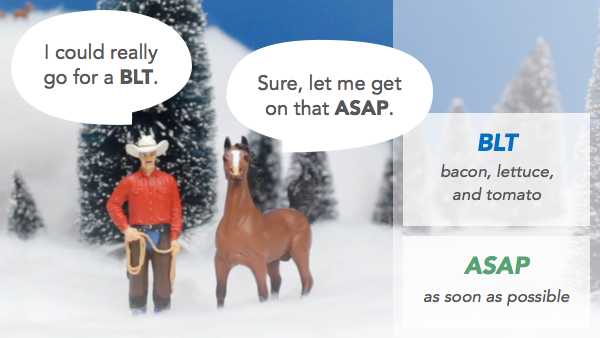
The pronunciation of acronyms can vary, however. While some are pronounced literally like the example above, others can actually be pronounced as a word, like UNICEF, POTUS, and NASA.
Sometimes it's just a question of, "Can the acronym be pronounced as a word?" A lot of acronyms can't because they don't have the right combination of vowels and consonants. However, there's no set rule that governs this. Knowing how to pronounce acronyms depends a lot your awareness of the world around you, but it's not the end of the world if you make a mistake.
Sometimes you may need to explain the acronym when using it in writing. Style guides suggest that you write the acronym first, followed by the full name or phrase in parentheses. You can also write them in the opposite order—whatever makes more sense. In short, if the acronym is more widely known, list it first; if it's more obscure, you may want to start with the entire phrase.

A lot of contemporary acronyms might need to be explained for different reasons (this also applies to the chat abbreviations that we discussed earlier). Not everyone will be familiar with slang like NIMBY (not in my back yard) and TGIF (thank goodness it's Friday). As always, this type of slang can be OK in certain contexts, but it might leave some readers feeling confused.
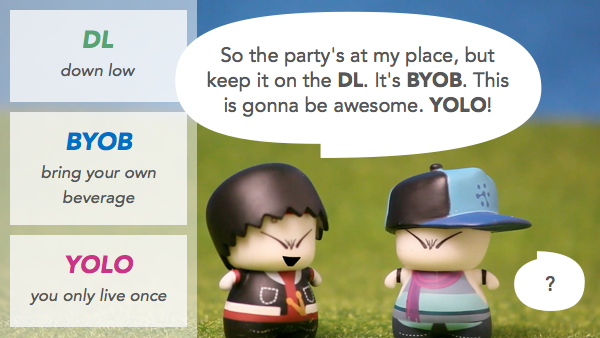
As you now know, abbreviations and acronyms can save time and space, and they can make your writing easier to read. Below is a sample that contains the full form of several different words, phrases, and expressions. Do you know which acronyms and abbreviations could be used as substitutes?

AKA is an acronym for also known as. Even though it could be pronounced as a word (it has the right combination of consonants and vowels), it's always pronounced literally—A-K-A.
Jr. is the abbreviation for Junior. It can be used to refer to someone who is a junior in name (for example, Martin Luther King, Jr.), or a junior in high school or college.
Sr. (Senior) is a related abbreviation—as in Martin Luther King, Sr.
RSVP stands for répondez s'il vous plaît. If you've heard the acronym before, but never knew what it stood for, that's OK.
This is one of those special cases where the acronym is now more common than the original phrase. Not only is répondez s'il vous plaît long and sort of old-fashioned—it's also in a completely different language!
OJ stands for orange juice—yet another term that we didn't cover in this lesson, but it's easy to see the connection. Did you get this one right?
OJ is more of a slang term than an official abbreviation or acronym. It's used almost exclusively in conversation and casual writing (and your weekly shopping list).
PB&J stands for peanut butter and jelly. Like OJ, it's more like slang than an official acronym.
The interesting thing about PB&J is that it's sort of its own "thing," because the acronym is so memorable and symbolic. In other words, you don't have to say "PB&J sandwich"—you can just say PB&J.
Misc. is the abbreviation for miscellaneous. Good guess if you got this one right.
Misc. is a very common substitute for miscellaneous—even in formal writing—simply because the original word is so long.
Min is the abbreviation for minute. Notice that it's not capitalized in the sentence, and it doesn't use a period either.
This is common for certain types of abbreviations (especially those related to time and measurement). However, in your own writing, feel free to add a period if it makes the abbreviation easier to read.
Capt. is the abbreviation for Captain. Maybe you've seen it spelled a different way on a certain cereal box—ever heard of Cap'n Crunch?
That's more of a slang abbreviation, used in conversation and casual writing (sometimes as a joke). Capt. is the official abbreviation; it's used in the military, police force, and other organizations.
Inc. is the abbreviation for Incorporated. It's one of the few abbreviations that can be pronounced literally (as in rhymes with "ink"), or the same as the word it's based on.
It often depends on the business' branding, and how they prefer to be known to the public.
PM is the abbreviation for Post Meridiem. Good job if you got this one correct! If you didn't, that's OK—the abbreviation is far more common than the expression it's based on.
Luckily, you don't have to remember exactly what PM stands for. It's much easier to think of it as an abbreviation for afternoon.
Feb. is a common abbreviation for February. We didn't discuss this in the lesson, but if you look closely at the abbreviation, you can probably see where it comes from—it's simply the first three letters of the word.
There's an abbreviation for almost every month, from January (Jan.) to December (Dec.). Some months don't have an abbreviation because the spelling is already so short (May, June, and July).
VIP is an acronym for very important person(s). It's common for clubs to have VIP lounges or services, but people can be VIPs too (i.e., the person is a very important person).
VIP is pronounced literally (V-I-P) rather than "vip" or "veep."
/en/grammar/commas/content/